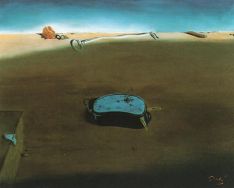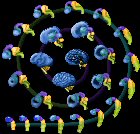“I would like to be able to download the ability to juggle. There’s nothing more boring than learning to juggle.”1 That’s artificial intelligence scientist Marvin Minsky, talking about a new AI project at MIT. He points to the fact that his iPhone can download thousands of applications, instantly allowing it to perform with new capacities. Why not do the same with the brain?
Minsky believes that we can separate the ability to juggle from the internal transformations that take place while learning to juggle. Knowledge, in the Cartesian style, is seen as something “pure,” removed from subjective participation and the involvement of our body/mind.
Scientists who claim to be at the forefront of human progress are still entangled in paradigms hundreds of years old. Given Minsky’s vision, even inner knowledge can be represented digitally and downloaded to our neurophysiology, just as we do with a computer application. Kurzweil and others forecast such a future.
Here is Aldous Huxley’s view:
Some artists have practised the kind of self-naughting which is the indispensable pre-condition of the unitive knowledge of the divine Ground. Fra Angelico, for example, prepared himself for his work by means of prayer and meditation; and from the foreground extract from Chuang Tzu we see how essentially religious (and not merely professional) was the Taoist craftman’s approach to his art. Here we may remark in passing that mechanization is incompatible with inspiration. The artisan could do and often did do a thoroughly bad job. But if, like Ch’ing, the chief carpenter, he cared for his art and were ready to do what was necessary to make himself docile to inspiration, he could and sometimes did do a job so good that is seemed “as though as supernatural execution.” Among the many and enormous advantages of efficient automatic machinery is this: it is completely fool-proof. But every gain has to be paid for. The automatic machine is fool-proof; but just because it is fool-proof it is also grace-proof. The man who tends such a machine is impervious to every form of aesthetic inspiration, whether of human or of genuinely spiritual origin. “Industry without art is brutality.” But actually Ruskin maligns the brutes. The industrious bird or insect is inspired, when it works, by the infallible animal grace of instinct – by Tao as it manifests itself on the level immediately above the physiological.” 2
When we don’t feel “presence” in our actions or value our activities as media for our growth, we move toward automating everything that can be automated, including activities which expand our soul’s capacities. In Zen monasteries, even the most repetitive tasks—like cleaning the rice—are used as a path for awareness. But the contemporary ego wants goals – and wants to reach them fast.
1Chandler, D.L. “Rethinking artificial intelligence”. MITnews. http://web.mit.edu/newsoffice/2009/ai-overview-1207.html
2Aldous Huxley, The Perennial Philosophy, New York: Harper & Row, 1945, p. 171.
“Mi piacerebbe scaricare istantaneamente la capacità di fare giochi di prestigio. Non c’è nulla di più noioso che impararli.”1 Così si esprime lo scienziato di intelligenza artificiale Marvin Minsky a proposito di un nuovo progetto al MIT. Egli si riferisce al fatto che il suo iPhone può scaricare migliaia di applicazioni che istantaneamente ne ampliano le facoltà. Perché non si può fare la stessa cosa con il cervello?
Minsky crede che sia possibile separare la capacità di fare giochi di prestigio dalle trasformazioni interiori connesse all’apprendimento di questa arte. La conoscenza, nell’ottica cartesiana, è considerata qualcosa di “puro”, che prescinde dalla partecipazione soggettiva e dal coinvolgimento del corpo/mente.
Gli scienziati che affermano di essere l’avanguardia del progresso umano sono ancora prigionieri di paradigmi risalenti a centinaia di anni fa. Secondo le concezioni di Minsky, ogni conoscenza interiore è rappresentabile digitalmente e scaricabile nella nostra neurofisiologia, allo stesso modo di un’applicazione al computer. Kurzweil e altri prevedono un tale futuro.
Ecco al proposito quanto disse Aldous Huxley:
Alcuni artisti hanno praticato quel genere di autoannullamento che è condizione preliminare e indispensabile della conoscenza unitiva del divino Fondamento. Il Beato Angelico, ad esempio, si preparava al lavoro con la preghiera e la meditazione; e dal brano precedente di Chuang-tzu vediamo come fosse essenzialmente religioso (e non semplicemente professionale) il modo di accostarsi alla sua arte proprio dell’artigiano taoista. Possiamo qui osservare di passaggio che la meccanizzazione è incompatibile con l’ispirazione. L’artigiano poteva fare e spesso faceva un lavoro pessimo. Ma se come Ch’ing, il falegname capo, egli si preoccupa dell’arte sua ed è pronto a far ciò che è necessario per rendersi docile all’ispirazione, allora egli può fare (e talvolta lo ha fatto) un lavoro così buono da sembrare “quasi di esecuzione soprannaturale”. Tra i molti ed enormi vantaggi dei macchinari efficienti automatici c’è questo: sono completamente inattaccabili dagli sciocchi. Ma ogni acquisto si deve pagare. La macchina automatica è inattaccabile dagli sciocchi; ma proprio per questo è anche inattaccabile dalla grazia. L’uomo che opera su questa macchina è impermeabile a ogni forma d’ispirazione estetica, sia di origine umana sia genuinamente spirituale. “L’industria senz’arte è bestialità”. Ma qui Ruskin diffama le bestie. L’uccello o l’insetto operoso è ispirato, quando lavora, dalla infallibile grazia animale dell’istinto: dal tao quale si manifesta sul piano immediatamente superiore al fisiologico.2
Quando non avvertiamo la “presenza” nelle nostre azioni o non consideriamo ciò che facciamo uno strumento della nostra evoluzione, tendiamo ad automatizzare tutto ciò che può essere automatizzato, incluse quelle attività volte a espandere la nostra anima. Nei monasteri Zen, anche le attività più ripetitive come mondare il riso vengono usate come una via verso la consapevolezza. Ma l’ego contemporaneo vuole degli obiettivi, e li vuole raggiungere velocemente.
1Chandler, D.L. “Rethinking artificial intelligence”. MITnews. http://web.mit.edu/newsoffice/2009/ai-overview-1207.html
2Aldous Huxley, The Perennial Philosophy, New York: Harper & Row, 1945, p. 171.

 [en]
[en]